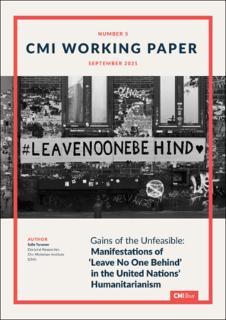Gains of the Unfeasible: Manifestations of ‘Leave No One Behind’ in the United Nations’ Humanitarianism
Original version
Bergen: Chr. Michelsen Institute (CMI Working Paper WP 2021:05) 12 p.Abstract
Abstract ‘Leave no one behind’ in the context of the United Nations’ humanitarianism poses a noble ideal yet a challenging practice. The concept showcases terminological prevalence particularly in policy, yet unfeasibility against the enormity of humanitarian needs and limited resources to respond. Therefore, this working paper asks the following: If the concept is not a feasible aim, what does it provide? I suggest that the meaning of ‘leave no one behind’ captures three overlapping humanitarian themes at once: humanitarian language, humanitarian donorships and humanitarian diplomacy. Accompanied by interview material with humanitarian practitioners from the UN Office for the Coordination of Humanitarian Affairs (OCHA), I conclude that ‘leave no one behind’ presents gains for humanitarian action in terms of political and economic support, even though it lacks operational potential for universal implementation. Access the working paper in PDF format through the selection panel above This publication is part of the project “Humanitarian Diplomacy: Assessing Policies, Practices and Impact of New Forms of Humanitarian Action and Foreign Policy” funded by the Research Council of Norway (project number 286859) and led by Antonio De Lauri at the Chr. Michelsen Institute.
